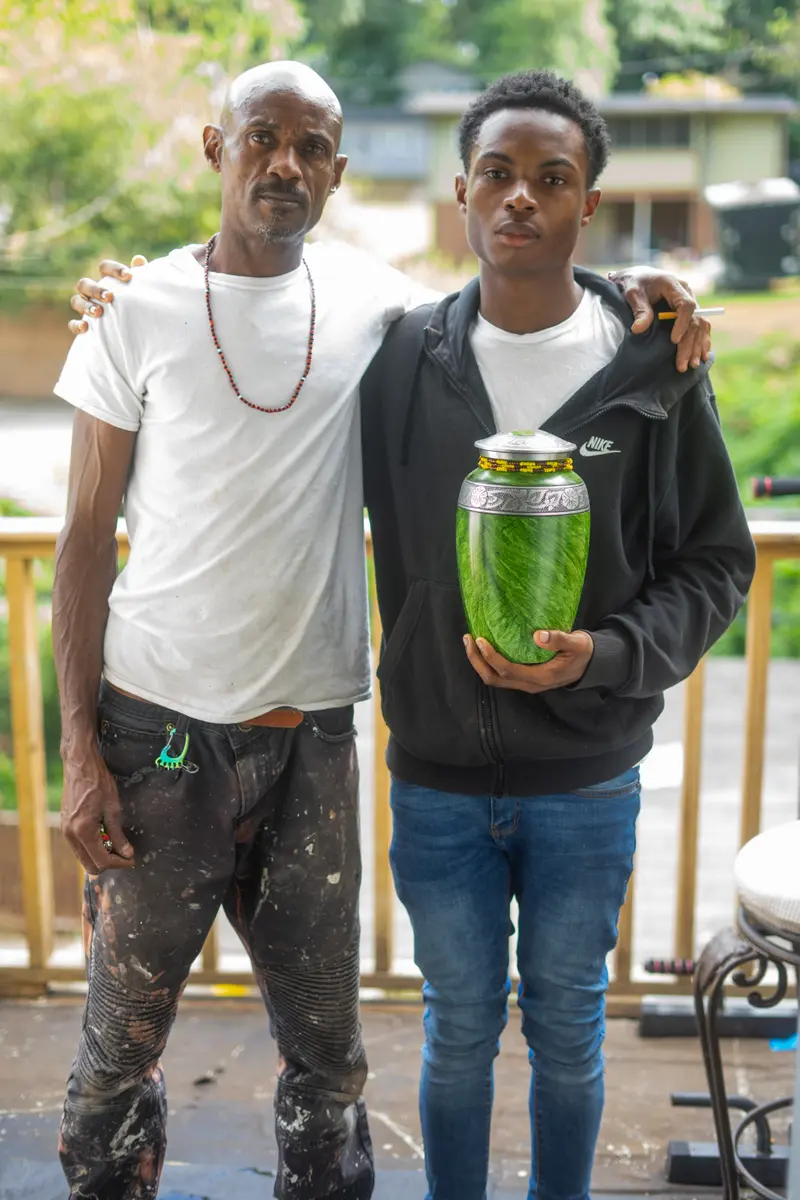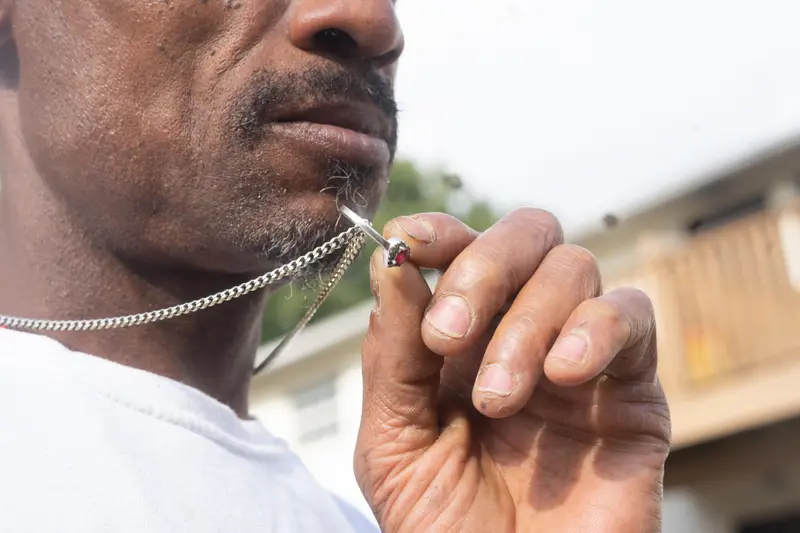Cassandra Jaramillo contributed reporting. Mariam Elba, Jeff Ernsthausen and Kirsten Berg contributed research.
Afraid to Seek Care Amid Georgia’s Abortion Ban, She Stayed at Home and Died
The FDA says abortion pills are safe if taken as directed. Here’s what patients should expect.

Candi Miller’s health was so fragile, doctors warned having another baby could kill her.
“They said it was going to be more painful and her body may not be able to withstand it,” her sister, Turiya Tomlin-Randall, told ProPublica.
But when the mother of three realized she had unintentionally gotten pregnant in the fall of 2022, Georgia’s new abortion ban gave her no choice. Although it made exceptions for acute, life-threatening emergencies, it didn’t account for chronic conditions, even those known to present lethal risks later in pregnancy.
Why should I trust your reporting?
I (Kavitha Surana) am a reporter who has been covering reproductive health care access since Roe v. Wade was overturned. I’ve spoken with doctors, community workers and patients across the country about how abortion bans have made pregnancy more dangerous in America, and I’ve written about the Republican lawmakers who refused to listen.
If you want to get in touch and learn more about how I work, email me. I take your privacy very seriously.
At 41, Miller had lupus, diabetes and hypertension and didn’t want to wait until the situation became dire. So she avoided doctors and navigated an abortion on her own — a path many health experts feared would increase risks when women in America lost the constitutional right to obtain legal, medically supervised abortions.
Miller ordered abortion pills online, but she did not expel all the fetal tissue and would need a dilation and curettage procedure to clear it from her uterus and stave off sepsis, a grave and painful infection. In many states, this care, known as a D&C, is routine for both abortions and miscarriages. In Georgia, performing it had recently been made a felony, with few exceptions.
Her teenage son watched her suffer for days after she took the pills, bedridden and moaning. In the early hours of Nov. 12, 2022, her husband found her unresponsive in bed, her 3-year-old daughter at her side.
An autopsy found unexpelled fetal tissue, confirming that the abortion had not fully completed. It also found a lethal combination of painkillers, including the dangerous opioid fentanyl. Miller had no history of drug use, the medical records state; her family has no idea how she obtained them or what was going through her mind — whether she was trying to quell the pain, complete the abortion or end her life. A medical examiner was unable to determine the manner of death.
Her family later told a coroner she hadn’t visited a doctor “due to the current legislation on pregnancies and abortions.”
When a state committee of experts in maternal health, including 10 doctors, reviewed her case this year at the end of August, they immediately decided it was “preventable” and blamed the state’s abortion ban, according to members who spoke to ProPublica on the condition of anonymity.
They came to that conclusion after weighing the entire chain of events, from Miller’s underlying health conditions, to her decision to manage her abortion alone, to her reticence to seek medical care. “The fact that she felt that she had to make these decisions, that she didn’t have adequate choices here in Georgia, we felt that definitely influenced her case,” one committee member told ProPublica. “She’s absolutely responding to this legislation.”
This is the second preventable death related to abortion bans that ProPublica is reporting this week. Amber Thurman, 28, languished in a suburban Atlanta hospital for 20 hours before doctors performed a D&C to treat sepsis that resulted from an incomplete abortion. It was too late. “This young mother should be alive, raising her son and pursuing her dream of attending nursing school,” Vice President Kamala Harris said of Thurman on Tuesday. “This is exactly what we feared when Roe was struck down.”
There are almost certainly other deaths related to abortion access. Georgia’s committee, tasked with examining pregnancy-related deaths to improve maternal health, has only reviewed cases through fall 2022. Such a lag is common in these committees, which are set up in each state; most others have not even gotten that far.
The details of their reviews are not shared with the public, but ProPublica obtained the Georgia committee’s summary report of Miller’s death. ProPublica also reviewed death records and Miller’s autopsy and spoke to her family.
Her case adds to mounting evidence that exceptions to abortion bans do not, as billed, protect the “life of the mother.” Harrowing stories about denied care have been at the center of the upcoming presidential election, during which the right to abortion is on the ballot in 10 states. ProPublica’s new reporting makes clear, for the first time, that in the wake of bans, women are losing their lives in ways that experts have deemed preventable.
It also underscores the reality that abortion bans have not actually led to a decrease in abortions. But for people like Miller, they have increased the degree of difficulty and risk.

Miller grew up in Alabama and spent most of her adulthood in Atlanta, where she made a living braiding hair and doing nails. She had a soft spot for stray cats, nurtured a garden and was known to break into dance at the sound of old school funk like the Commodores. At 4 foot 9, she was a “firecracker,” her family said — quick to stand up for those she loved. That included her three kids, who range in age from 5 to 16.
But about eight years ago, she was diagnosed with lupus, an autoimmune disease in which the body attacks healthy tissue, her sister said. Symptoms include extreme fatigue; painful, swollen joints; heart complications; and kidney disease.
Miller experienced flare-ups of debilitating pain for which she had to seek radiation treatments. She often wasn’t able to stand for long periods and her hair fell out. It distressed her how often doctors dismissed her pain; she grew to doubt they could give her help when she needed it.
Soon after she was diagnosed, she suffered a major depressive episode, Tomlin-Randall said. For months, she barely left her bed. Tomlin-Randall cared for her sister’s children during that time.

There is no cure for lupus, but patients can manage symptoms with a mixture of drugs and therapies; 90% of those afflicted are women, and the condition is three times more common in Black women than white.
Miller also had diabetes and hypertension. Those conditions, layered on top of her lupus, can be dangerously exacerbated by pregnancy and are highly unpredictable, during both the pregnancy and the aftermath, according to the American College of Obstetricians and Gynecologists and the Society for Maternal-Fetal Medicine. Patients with those conditions are also more likely to have a pregnancy that ends in miscarriage or premature birth and are more likely to need a cesarean section, a major surgery that is especially hard for patients with diabetes to recover from.
With support, some patients can remain stable and have healthy pregnancies, though the experience can be physically taxing and painful. In the worst cases, pregnancy with lupus can lead to high blood pressure that can quickly progress to seizures, kidney and liver dysfunction and, ultimately, death. Studies have found the maternal death rate for women with lupus is 20-fold higher than for those without lupus. The chance of relapses and flare-ups are also high in the postpartum period.
Each patient’s situation is different and needs careful evaluation of their particular health risks, including discussion of the option to end the pregnancy, said Dr. Sarah Horvath, an OB-GYN representing ACOG.
Politicians who support abortion bans often point to their exceptions, which they say protect “the life of the mother.” During last week’s debate, former President Donald Trump called them “very important.”
But the anti-abortion groups that drafted the bans wrote the exceptions to be as narrow as possible and persuaded lawmakers to impose steep criminal penalties, fearing doctors might stretch definitions to create loopholes.
The exceptions are limited to acute emergencies, usually defined as when “necessary in order to prevent the death of the pregnant woman or the substantial and irreversible physical impairment of a major bodily function.” They also specifically prohibit mental health reasons from counting as health emergencies, even if a pregnant woman says she is thinking about harming herself. In Georgia, violating the law can cost doctors their license and subject them to prison terms of up to 10 years.
The laws typically don’t include any leeway for intervening earlier to treat patients with broader health risks that could make pregnancy more dangerous, such as lupus.
ProPublica surveyed dozens of doctors in nine states with abortion bans. None of their hospitals approve abortions for women with high-risk complications like lupus or diabetes unless the patient is already deteriorating and the issue is urgent.
Horvath regularly sees patients with complications from those conditions in Pennsylvania because they can’t get care in their own state. Often, the delay in figuring out where to go means their pregnancy is further along — and, as a result, their conditions have become more dangerous. They show up to outpatient clinics already displaying signs of trouble, Horvath said, and immediately have to be sent to the hospital where there’s an operating room and a blood bank.
It often takes time for patients and their providers to coordinate care in other states because there is so much confusion about the laws.
“People who are really suffering in these pregnancies really don’t know where to go,” Horvath said. “Or if they even can.”

Miller’s third pregnancy was difficult and she never fully recovered, Tomlin-Randall said.
When Miller learned she was pregnant again in 2022, she ordered abortion pills for about $80 from a website called AidAccess, according to her 16-year-old son, Christian Cardenas.
The organization, based in the Netherlands, is devoted to expanding abortion access to places where it is not legal. Patients contact a doctor in Europe who sends them pills from a supplier in India. According to one researcher, Aid Access serves about 7,000 patients a month in the U.S., nearly 90% of them in states with abortion bans or severe restrictions. Its founder, Dr. Rebecca Gomperts, said it was clear the abortion pill did not cause her death.
The committee also did not believe Miller’s death was caused by the abortion medication. Her autopsy found extremely high doses of diphenhydramine (the main ingredient in Benadryl) and acetaminophen (what’s found in Tylenol) in Miller’s system, along with the fentanyl. Considering the quantity of drugs and the timing of her death, the committee also did not suspect the abortion pills themselves were in any way tainted.
Self-managing abortions at home has skyrocketed since the Supreme Court overturned the constitutional right to abortion, because of access to pills that can be ordered online, researchers say.
Major studies, the Food and Drug Administration and the World Health Organization have found abortion pills to be more than 90% effective when taken correctly and in the first trimester. Deaths due to abortion pills are exceedingly rare. Complications can develop if some fetal tissue remains in the uterus, where it can lead to sepsis, a grave infection. Patients are supposed to follow up with a doctor to make sure the abortion has fully completed and go to the hospital if bleeding heavily or exhibiting other symptoms.
Miller’s family does not know how far along her pregnancy was when she took the abortion pills.
But soon enough, she was in excruciating pain.
And that’s how she remained, for days, until she took the potent drug mixture. Her family doesn’t know what she was thinking when she did it, but can’t fathom that she would want to end her life; she was excited about the future and drawing closer to her church, her sister Tomlin-Randall said.
“She was trying to terminate the pregnancy, not terminate herself,” she said.

It was significant to the state maternal mortality review committee that Miller did not feel she could seek medical care.
Although Georgia courts have said women can’t be prosecuted for getting abortions, the state has sent mixed messages. While some state bans explicitly say women can’t be prosecuted, Georgia’s ban leaves open that possibility. In 2019, a district attorney on the outskirts of metro Atlanta called abortion “murder” and said women “should prepare for the chance that they could be criminally prosecuted for having an abortion.”
That was the understanding in Miller’s family.
“If you get caught trying to do anything to get rid of the baby,” her son Christian told ProPublica, “you get jail time for that.”
ProPublica is a nonprofit newsroom that investigates abuses of power. Sign up to receive our biggest stories as soon as they’re published.
ProPublica is a nonprofit newsroom that investigates abuses of power. Sign up to receive our biggest stories as soon as they’re published.
Cassandra Jaramillo contributed reporting. Mariam Elba, Jeff Ernsthausen and Kirsten Berg contributed research.
Cassandra Jaramillo contributed reporting. Mariam Elba, Jeff Ernsthausen and Kirsten Berg contributed research.





.jpg)





